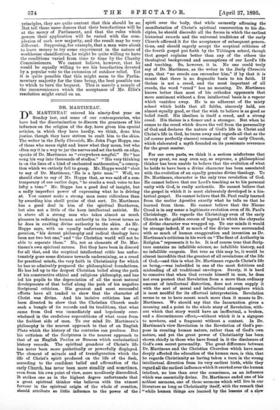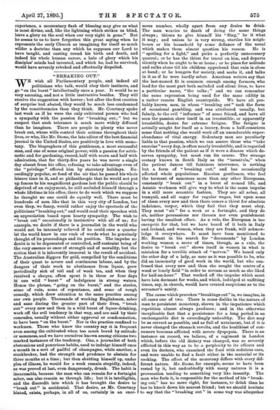DR. MARTINEAU.
DR. MARTINEATJ entered his ninety-first year on Sunday last, and some of our contemporaries, who have had the discrimination to discern the greatness of his influence on the religion of the day, have given him special articles, in which they have hardly, we think, done him justice, though they have striven to exalt him to the skies. The writer in the Daily Chronicle, Mr. John Page Hopps, one of those who mean right and know what they mean, but who of ten say it in a way to jar the nerves and set the teeth on edge, speaks of Dr. Martineau as "everywhere songful." He " has sung his way into thousands of studies." "His very thinking is on the lines of a kind of enchanted mathematics," a concep- tion which we entirely fail to grasp. Mr. Hopps would" elect to say of Dr. Martineau, He is a lyric man.'" Well, we should elect to say of Mr. Hopps that, as was said of a con- temporary of our earlier days, "he cracks a weak voice to too lofty a tune." Mr. Hopps has a good deal of insight, but a sadly imperfect power of expressing what be is driving at. You cannot make a strong man more ridiculous than by awarding him shrill praise of that sort. Dr. Martineau has a good deal in him of the spiritual Beethoven, but also not a little of the keen intellectual satirist. He is above all a strong man who takes almost as much pleasure in reducing human authority to its lowest terms as he does in exalting divine authority to the skies. As Mr. Hoppe says, with an equally unfortunate note of exag- geration, "his devout philosophy and radical theology have been not two but one," and "the Christian world will not be able to separate them." No, not as elements of Dr. Mar- tineau's own spiritual nature. But they have been in discord for all that, and the sceptical intellectual critic has unfor- tunately gone some distance towards undermining, as a creed for practical minds, the very faith in Christianity for which he has so admirably prepared the philosophical foundations. He has led up to the deepest Christian belief along the path of his constructive ethical and religious philosophy, and has led his pupils to the depreciation of all the most natural developments of that belief along the path of his negative Scriptural criticism. His greatest and most successful efforts have all tended to show that the character of Christ was divine. And his incisive criticism has all been directed to show that the Christian Church made such a bungle of its records and its traditions, that what came from God was immediately and hopelessly over- whelmed in the credulous superstitions of what came from the feeblest side of man. To our mind Dr. Martineau's philosophy is the nearest approach to that of an English Plato which the history of the centuries can produce. But his criticism of the Scriptures is the nearest approach to that of an English Paulus or Strauss which ecclesiastical history records. The spiritual grandeur of Christ's life has never been more pathetically or powerfully displayed. The element of miracle and of transfiguration which the life of Christ's spirit produced on the life of the flesh, according to the confident belief and affirmation of the early Church, has never been more steadily and sometimes, even from his own point of view, more needlessly discredited. It strikes one as in the highest degree unfortunate that a great spiritual thinker who believes with the utmost fervour in the spiritual origin of the whole of creation, should attribute so little influence to the power of the
spirit over the body, that while earnestly affirming the manifestation of Christ's spiritual resurrection to his dis- ciples, he should discredit all the forms in which the earliest historical records and the universal traditions of the early Church affirmed it for the acceptance of subsequent genera.
tions, and should eagerly accept the sceptical criticism of the fourth gospel put forth by the Tubingen school, though that gospel explains better than any of the others the theological background and assumptions of our Lord's life and teaching. So, however, it is. No one could truly say of Dr. Martineau, as the writer in the Daily Chronicle says, that "no creeds can encumber him," if by that it is meant that there is no dogmatic basis to his faith. If theism is not a creed, and the most important of all creeds, the word "creed" has no meaning. Dr. Martineau knows better than most of his orthodox opponents that mere sentiment without a firm intellectual basis is a vapour which vanishes away. He is no adherent of the misty school which holds that all faiths, sincerely held, are almost equally good, or that the wish to believe is as good as belief itself. His idealism is itself a creed, and a strong creed. His theism is a firmer and a stronger. But when he comes to the creed which draws the veil from the personality of God and declares the nature of God's life in Christ and Christ's life in God, he turns away and regards all that as the (of course perfectly sincere) romancing of the early Church, which elaborated a myth founded on its passionate reverence for the great master.
For our own parts, we think it a serious misfortune that so very great, we may even say, so supreme, a philosophical thinker has been unable to believe that the evolution of what he holds to have been a divine character has been associated with the evolution of an equally genuine divine theology. To Dr. Martineau, character is the only true revelation of God. He cannot believe that our Lord's teaching as to his personal unity with God, is really authentic. He cannot believe that the gospel in which it is most elaborately developed is a his- torical gospel. He cannot believe that St. Paul really learned from the earlier Apostles exactly what he tells us that he learned from them. He cannot believe that the Nicene Creed is in any sense a legitimate evolution even of St. Paul's Christology. He regards the Christology even of the early Church as the golden cocoon of legend in which the chrysalis of divine character was wrapped up. To our minds it would be strange indeed, if so much of the divine were surrounded with so much of human exaggeration and invention as Dr. Martineau's criticism in his work on "The Seat of Authority in Religion" represents it to be. It is of course true that Scrip- ture contains no infallible science, no infallible history, and no infallible exegesis. But true as this may be, it would be almost incredible that the greatest of all revelations of the life of God,—and this is what Dr. Martineau regards Christ's life as being,—was imbedded in one of the most fictitious and misleading of all traditional envelopes. Surely, it is hard to conceive that when God reveals himself in man, he does not even protect that Revelation from a more than ordinary amount of intellectual distortion, does not even supply it with the sort of moral and intellectual atmosphere which is most needful for its effectual interpretation. Revelation seems to us to have meant much more than it means to Dr. Martineau. We should say that the Incarnation gives a meaning and a point to the whole story of Revelation, with- out which that story would have an ineffectual, a broken, and a discontinuous effect,—without which it is a signpost to nowhere, and a fragment without a context. In Dr. Martineau's view Revelation is the Revelation of God's pur- pose in creating human nature, rather than of God's own nature, and yet the great power of Christianity has been shown chiefly in those who have found in it the disclosure of God's own secret personality. The great difference between Dr. Martineau and the Christian Churches which have most deeply affected the education of the human race, is this, that he regards Christianity as having taken a turn in the wrong intellectual direction from its very earliest birth, while they regard all the earliest influence which it exerted over the human intellect, no less than over the conscience, as an influence which was essentially divine. Dr. Martineau ended one of his noblest sermons, one of those sermons which will live in our literature as long as Christianity itself, with the remark that "while human things are learned by the lessons of a slow
experience, a momentary flash of blessing may give us what is most divine, and, like the lightning which strikes us blind, leave a glory on the soul when our very sight is gone." But he seems to us to have forgotten this great saying when he represents the early Church as imagining for itself so much wilder a doctrine than any which he supposes our Lord to have taught, and casting round his birth and death, and indeed his whole human career, a halo of glory which his disciples' minds had invented, and which he, had he survived, would have severely rebuked and effectually dispelled.



















































 Previous page
Previous page